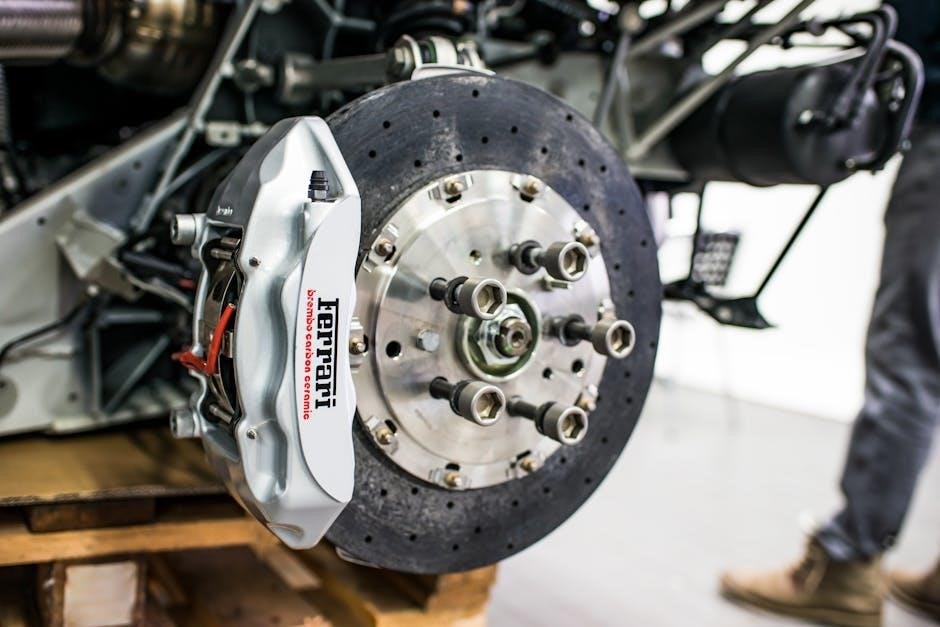Car wash equipment is essential for modern automotive care, offering efficient cleaning solutions․ From pressure washers to vacuums, each tool plays a vital role in ensuring spotless results and customer satisfaction․
Overview of Car Wash Equipment
Car wash equipment encompasses a wide range of tools and machinery designed to efficiently clean and maintain vehicles․ This includes pressure washers, vacuum cleaners, drying equipment, and cleaning solutions․ Each type of equipment serves a specific purpose, from removing dirt and grime to drying surfaces thoroughly․ Automated systems often integrate these tools for streamlined operations․ Proper selection and maintenance of equipment ensure optimal performance and longevity․ Additionally, waste management systems are crucial for handling water and chemical runoff responsibly․ Modern car washes rely on advanced technologies to enhance efficiency and reduce environmental impact․ Understanding the role of each piece of equipment is vital for running a successful and eco-friendly car wash business․
Importance of Proper Equipment Selection
Proper equipment selection is crucial for the efficiency and profitability of a car wash business․ The right tools ensure effective cleaning, reduce operational costs, and minimize environmental impact․ High-quality equipment, such as pressure washers and vacuums, enhances performance and longevity․ Scalability is another key factor, as equipment should adapt to business growth․ Energy-efficient and eco-friendly options can lower utility bills and attract environmentally conscious customers․ Additionally, selecting equipment that aligns with specific vehicle types ensures optimal results․ Proper equipment selection not only improves customer satisfaction but also supports long-term business sustainability․

Pressure Washers for Car Washes
Pressure washers are essential for effective car cleaning, offering powerful solutions to remove dirt and grime efficiently․ They come in various sizes and power levels to suit different car wash needs․
Types of Pressure Washers
Pressure washers for car washes come in various types, each designed for specific cleaning tasks․ Electric pressure washers are ideal for light-duty cleaning, offering quiet operation and ease of use․ Gas-powered washers are more robust, suitable for heavy-duty applications and larger car wash operations․ Diesel-powered models provide high power and durability, often used in commercial settings․ Portable pressure washers are great for mobility, allowing easy maneuverability around vehicles․ Additionally, there are hot water pressure washers, which are effective for removing tough grease and grime․ Each type has unique features, such as adjustable PSI settings and detergent injection capabilities, making them versatile for different car wash needs․
Key Features to Consider
When selecting pressure washers for car washes, key features to consider include power source, pressure rating (PSI), and flow rate (GPM)․ Electric models are ideal for light-duty tasks, while gas or diesel-powered washers offer higher power for heavy use․ Look for adjustable PSI settings to customize cleaning intensity․ Durable construction, such as stainless steel or brass components, ensures longevity․ Additional features like detergent injection systems and variable spray nozzles enhance versatility․ Energy efficiency and noise levels are also important, especially for urban locations․ Lastly, consider warranty and maintenance requirements to ensure long-term performance․ These factors help in choosing the right pressure washer for efficient and effective car washing operations․
Maintenance Tips for Pressure Washers
Regular maintenance is crucial to extend the life of pressure washers․ Always inspect hoses and connections for leaks or damage before use․ Clean or replace filters to ensure proper water flow and prevent clogs․ Store the equipment in a dry, protected area to avoid rust and corrosion․ Check and top off fluid levels, such as oil or detergent, as recommended by the manufacturer․ After each use, drain the hose and flush the system to remove debris․ Lubricate moving parts periodically to maintain smooth operation․ Avoid using harsh chemicals that could damage components․ Schedule professional servicing annually to address wear and tear․ Proper care ensures consistent performance and prevents costly repairs, keeping your car wash running efficiently․
Car Wash Vacuum Cleaners
Car wash vacuum cleaners are essential for removing dirt, debris, and water from vehicle interiors․ They enhance cleaning efficiency and prevent damage to surfaces during the detailing process․
Types of Vacuum Cleaners for Car Washes
Car wash vacuum cleaners come in various types, each designed for specific tasks․ Wet/dry vacuums are ideal for removing water and debris from surfaces, while handheld vacuums offer portability for detailing tight spaces․ Central vacuum systems provide powerful suction for heavy-duty cleaning, and backpack vacuums are ergonomic for extended use․ Each type caters to different car wash needs, ensuring efficient and thorough cleaning of vehicles․
Features to Look for in Car Wash Vacuums
When selecting car wash vacuums, consider key features such as powerful suction strength to handle water and debris effectively․ Look for models with adjustable settings to accommodate different cleaning tasks․ Filtration systems are crucial to prevent clogging and ensure longevity․ A long, flexible hose and various attachments can enhance reach and versatility․ Durability is essential, so opt for vacuums with sturdy construction․ Noise level is another factor, especially for businesses in residential areas․ Additionally, check for easy maintenance options, such as washable filters and accessible emptying mechanisms․ Portability features like wheels or backpack designs can improve efficiency․ Ensure the vacuum is compatible with your car wash’s power supply, whether electric or gas-powered, to meet operational needs․
Best Practices for Using Car Wash Vacuums
For optimal results, start by thoroughly rinsing the vehicle to loosen dirt and debris․ Use the vacuum’s upholstery and crevice tools to clean tight spaces and interior surfaces gently․ Avoid using excessive suction on delicate materials to prevent damage․ Regularly empty and clean the vacuum’s tank and filters to maintain performance․ For exterior use, focus on areas like wheel wells and door jams where dirt accumulates․ Always follow the manufacturer’s guidelines for maintenance and operation․ Store the vacuum in a dry, cool place to extend its lifespan․ By adhering to these practices, you can ensure efficient cleaning and prolong the durability of your car wash vacuum equipment․

Drying Equipment for Car Washes
Drying equipment is crucial for car washes, ensuring vehicles exit spotless and damage-free․ It enhances efficiency, preventing water spots and maintaining paint finish quality effectively․
Types of Drying Equipment
Drying equipment for car washes includes air blowers, microfiber towels, and infrared dryers․ Air blowers are popular for their efficiency, quickly removing water from surfaces․ Microfiber towels are gentle on paint and effective for manual drying․ Infrared dryers use heat to evaporate moisture, reducing drying time․ Each type offers unique benefits, catering to different car wash setups and preferences․ Air blowers are ideal for automated systems, while microfiber towels suit detail-oriented operations․ Infrared dryers are perfect for high-volume car washes needing rapid turnaround․ Proper use of these tools ensures a spotless finish, preventing water spots and enhancing customer satisfaction․ Selecting the right equipment depends on the car wash’s size, budget, and desired level of quality․
Best Practices for Using Drying Equipment
Using drying equipment effectively requires attention to detail and proper techniques․ Always ensure the equipment is clean and well-maintained to prevent damage or inefficiency․ For air blowers, maintain a consistent distance from the vehicle to avoid scratching surfaces․ Microfiber towels should be used gently, avoiding circular motions that might create swirl marks․ Infrared dryers should be set to the correct temperature to prevent overheating paint or sensitive materials․ Train staff to operate equipment correctly, emphasizing safety and efficiency․ Regularly inspect and replace worn-out parts, such as towels or blower nozzles, to maintain performance․ Additionally, monitor the drying process to ensure no water spots remain, as these can damage the vehicle’s finish over time․ Proper use of drying equipment enhances both the quality of the wash and customer satisfaction․

Car Wash Cleaning Solutions
Car wash cleaning solutions are essential for effective vehicle maintenance, offering detergents, polishes, and protectants tailored to various surfaces, ensuring a spotless finish and long-lasting protection․
Types of Cleaning Solutions
Car wash cleaning solutions come in various types, each designed for specific tasks․ Detergents are formulated to remove dirt and grime effectively, while wheel cleaners target brake dust and stains․ Glass cleaners ensure streak-free visibility, and leather conditioners protect and moisturize upholstery․ Degreasers tackle tough grease and oil-based stains, and paint protectants provide a barrier against environmental elements․ Additionally, eco-friendly solutions are gaining popularity for their biodegradable properties, catering to environmentally conscious customers․ Each type is tailored to address different areas and materials, ensuring a comprehensive cleaning process․ Proper selection based on vehicle surfaces and cleaning needs is crucial for optimal results and longevity of the vehicle’s finish․
Safe Usage and Storage of Cleaning Solutions
Proper handling and storage of cleaning solutions are critical for safety and effectiveness․ Always wear protective gloves and eyewear when using strong chemicals․ Ensure the area is well-ventilated to prevent inhalation of fumes․ Follow the manufacturer’s instructions for dilution ratios to avoid over-concentration, which can damage surfaces or cause skin irritation․ Store solutions in labeled, sealed containers away from direct sunlight and heat sources․ Keep them out of reach of children and pets․ Dispose of unused or expired products according to local regulations․ Regularly inspect containers for leaks or damage․ Eco-friendly solutions are a safer alternative, reducing environmental impact while maintaining cleaning efficiency․ Proper adherence to safety guidelines ensures a safe working environment and extends the lifespan of cleaning agents․

Waste Management Equipment
Effective waste management equipment ensures proper disposal of water and chemicals, reducing environmental impact and promoting sustainable car wash operations․
Types of Waste Management Systems
Car wash waste management systems include treatment systems, recycling units, and filtration devices․ Treatment systems remove contaminants like chemicals and oils from water․ Recycling units reclaim and reuse water, reducing consumption․ Filtration systems capture solids and debris, preventing clogs․ Containment units store hazardous waste safely․ Automated systems monitor and process waste efficiently․ These solutions ensure environmental compliance, reduce waste, and promote sustainability in car wash operations․ Properly managing waste is crucial for protecting the environment and maintaining operational efficiency․ Each system plays a key role in minimizing ecological impact while ensuring legal adherence․ Investing in suitable waste management equipment supports long-term business sustainability and resource conservation․ Modern car washes rely on these systems to handle waste responsibly and effectively, ensuring cleaner operations for the future․
Protocols for Proper Waste Disposal
Proper waste disposal in car washes requires strict adherence to environmental regulations․ Separate waste into categories like chemicals, oils, and solids to prevent contamination․ Use designated containers for hazardous materials and ensure they are sealed properly․ Regularly inspect and maintain waste management equipment to prevent leaks or failures․ Train staff on correct disposal procedures and provide clear guidelines․ Keep records of waste collection and disposal to ensure compliance with local laws․ Schedule periodic pickups by licensed waste management companies to handle hazardous materials safely․ Implement recycling programs for water and non-hazardous waste to reduce environmental impact․ Always follow local, state, and federal regulations to avoid penalties and protect the environment․ Proper waste disposal is essential for sustainable car wash operations and community health․